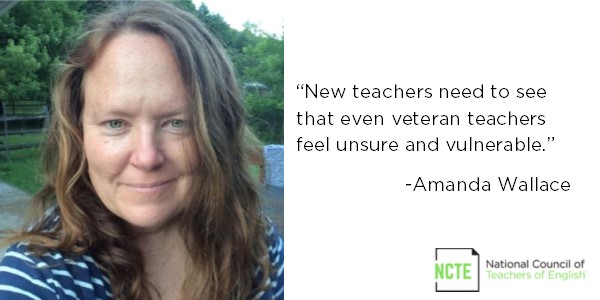This post is written by member Amanda Wallace.
I remember my first years of teaching. I taught 6th grade at a small K–8 school in rural North Carolina. I also remember not really knowing my beliefs about the best way to work with students. Some of my colleagues were focused not only on what the students were learning, but if the students came prepared with pencils and paper. They had elaborate systems for discipline and used silent lunch to punish students for lack of work. I can remember trying on the stifling persona of the “tough as nails” teacher, fearing that if I let my students know my weaknesses (sometimes I make mistakes) I would lose control of my classroom. My biggest fear, of course, was that I would be deemed incompetent by other faculty members.
What helped me find my way were my principal and my mentor teacher, who both acted as mentors. Because it was a small school, they were able to nurture me through the fear and frustration that can overwhelm a new teacher. I remember my mentor saying, “Honey, I’m on year twenty, and I still don’t always know what I’m doing.” My principal taught me to slow down and look at things from multiple perspectives. I thought I had to be “fair, firm and consistent,” and if a student stepped out of line, I had to dole out immediate punishment so I would earn students’ respect. Eventually, I learned to find my own style. The firm disciplinarian mold did not fit me well, but I found my own way, somewhere in the middle.
I am now finishing year twenty. Some days I still feel like I’m not really sure I know what I’m doing, but I go back to whatever problem I’m having with a class and try something new. New teachers need to see that even veteran teachers feel unsure and vulnerable. After years of observations and parent scrutiny, many of us veteran teachers have developed such thick skin that we begin to see our methods and our educational view as the only ones worthy or right. When new teachers think veteran teachers have all the answers, they are left feeling inadequate and insecure. If they cannot meet these perceived expectations, many times they leave teaching for good.
So I resolve to talk about my weaknesses to new teachers, student teachers, interns, and even my students. As a mentor, I will help new teachers find the teaching style that fits them, but also help them be aware that sometimes even twenty years into their career, they will still feel like they have no idea what they are doing, and that is okay. We will try a new strategy tomorrow.
Amanda Wallace teaches English at Watauga High School in Boone, NC. She is certified in middle grades education and high school language arts, and she has a master’s degree in reading education from Appalachian State University. She is also Nationally Board Certified in language arts. Amanda has been a cooperating teacher with the Teaching Excellence and Achievement Program since 2011. She participated in the Watauga Pakistan Exchange Program in 2014, and she was awarded a fellowship with Teachers for Global Classrooms in 2015, a year-long program which culminated with a field experience in the Philippines. She is currently a teacher fellow with Hope Street Group’s North Carolina Teacher Voice Network. She is a member of her school’s PLT leadership team and a mentor teacher. Her main focus is integrating global competency into high school English classrooms.

